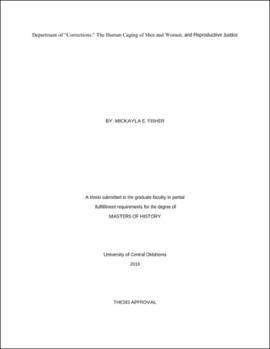| dc.contributor.author | Fisher, Mickayla | |
| dc.date.accessioned | 2021-01-15T20:05:12Z | |
| dc.date.available | 2021-01-15T20:05:12Z | |
| dc.date.issued | 2019 | |
| dc.identifier.uri | https://hdl.handle.net/11244/326830 | |
| dc.description.abstract | This thesis examines the prison system in the United States starting in the early 19th century and discusses punishments that were considered inhumane, resulting in the introduction of prisons. This research explores some of the injustices that prisoners face daily and how some of these issues conflict with their identity inside and outside of the prison. It also examines the conditions inside both state-owned prison facilities and private prisons. Prisons exist as Third-World structures in the First World, as inmates are forced to live in conditions that western society would often deem Third-World or developing conditions. A chapter in this thesis focuses on the high rates of women who have been incarcerated, particularly in Oklahoma, which has the highest rate of incarcerated women in the nation. Incarcerated women are overlooked by the system. despite the disruption that prison sentences cause for their families. This research also explores the family structure and how incarceration impacts not only the women but also their children as well. All these scenarios reflect a violation of reproductive rights and justice in the case of prisoners in the United States. The thesis explores the ways in which inmates can regain a sense of humanity and bodily autonomy through horticulture and end-of-life (EOL) programs. Such programs have proven to be two effective forms of rehabilitation for some prisons, since inmates are able to reconnect to their humanity through them. Throughout this thesis there will be a discussion of the reproductive justice framework and how it fits within the carceral system. The systematic construction of the prison industrial complex was made to control others, and it transformed into the contemporary version of the Department of "Corrections" (DOC). | en_US |
| dc.rights | All rights reserved by the author, who has granted UCO Chambers Library the non-exclusive right to share this material in its online repositories. Contact UCO Chambers Library's Digital Initiatives Working Group at diwg@uco.edu for the permission policy on the use, reproduction or distribution of this material. | |
| dc.title | Department of "Corrections" : the human caging of men and women, and reproductive justice | en_US |
